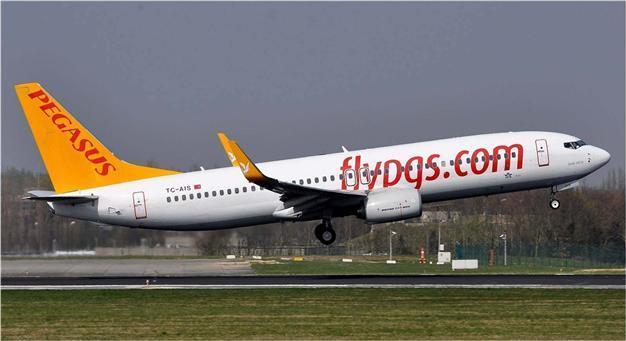Turkish, European airlines face serious problems due to sharp rise in US dollar: Pegasus CFO
Şebnem Turhan - İZMİR

DHA photo
The only remedy for struggling Turkish airliners, which have not benefited from the drop in oil prices due to existing hedging deals with fuel companies, amid the dramatic rise in the U.S. dollar is to sell tickets in the same currency, according to low-cost carrier Pegasus Airlines’ Chief Financial Officer (CFO) Serhan Ulga.Ulga noted that most European airliners are in financial difficulty due to the rises in the U.S. dollar against almost all currencies, especially the euro.
“The only remedy for us is to sell our tickets in the U.S. dollar … Our foreign exchange rate losses, which were at around 13 percent, have now decreased to 2-3 percent after our initiatives to increase operational productivity and growth levels, and after the decreases in fuel prices,” he said.
Ulga added that around 60 percent of Pegasus Airlines’ costs are in the U.S. dollar.
“The rise in the dollar’s value against the Turkish Lira and euro has been pushing our costs up. While the euro-dollar parity was around 1.37 in the first half of 2014, this rate had plunged to 1.12 by the same period this year. Our fuel and airplane renting costs in the euro or lira have risen by 20 percent this year, even though all other conditions are the same,” he stated.
Pegasus Airlines recently announced that it has changed the base currency for pricing of international tickets originating in Turkey from the euro to the U.S. dollar. The decision became effective as of July 1, the company said in a written statement on June 12.
Ulga said Pegasus will not turn to euro-basis sales until the euro-dollar parity sees 1.20s.
He also suggested that the oil slump was actually good news for the sector, but sector players have not been able to enjoy this due to the existing hedging deals with jet fuel sellers.
“Our loss has been around 160-170 million Turkish Liras from the hedging deals, although the hedges in our deals are much lower than the sector average. While the jet fuel was $800 per ton last year, the price has decreased to around $400-500. So we’ll not make a hedge deal this year,” he added.
Ulga also noted that the ongoing renovation works in the Sabih Gökçen Airport on Istanbul’s Asian side had hit their sales.
“The authorities have being doing these works over the last two months. The work is of great importance for us, but our loss is around 8-10 million liras as the airport is closed between 01.00 a.m. and 5. a.m. every day,” he said.
















